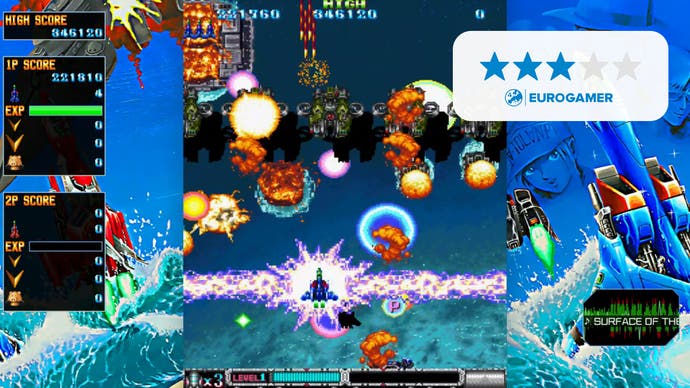Batsugun Saturn Tribute Boosted review - a mixed return for the original bullet hell icon
Best laid Toaplans.
These days the term 'bullet hell' gets thrown around a little too enthusiastically, and not only in the 2D shooter space.
Thanks to the genre's now entrenched renaissance, the label has transcended its former status as part of the lexicon of a niche online community, evolving into part of the everyday language of gaming more broadly. And so it is that marketers today eagerly pack press releases with claims that a new FPS or roguelike action-RPG brings 'bullet hell' delights.
In truth, 'bullet hell' describes a very specific type of shooter, where overwhelmingly dense curtains of enemy firepower, diminutive hitboxes, aggressive difficulty, cavernous scoring complexity and frenetic pacing are all present. Others might tell you that a certain visual style defined by ornate pixel-based sprite work and gaudy firepower are equally defining.
Many more will assert that Toaplan's 1993 arcade shooter Batsgun was the first true example of the form. And now it's back, quietly modernised under the moniker Batsugun: Saturn Tribute Boosted. In fact, the package is essentially a port of a port, in that it brings contemporary genre devotees an updated version of the 1996 Japanese Sega Saturn compilation, itself simply titled Batsugun. As such, as with that Saturn release, you get a subtly reworked arrangement of the arcade original, and the arguably superior Batsugun Special Version; a fairly significant reworking that was initially shown as a coming arcade release at 1994's AOU expo, before fading from view with Toaplan itself.
Before tucking into what all that means for a modern shmup player, it's absolutely worth briefly asserting Toaplan's role in evolving the 2D shooter concept towards bullet hell, and Batsugun's status as a very specific moment in the genre's forward journey. Because, in no small part, a core part of Batsugun Saturn Tribute Boosted's appeal is that it offers a chance to own a critical moment in the genre's history.
Formed in 1979 before moving on games in 1984, the Japanese studio released all manner of beloved shooters, each of which would increase the intensity, nuance, bullet count and visual exuberance seen in the genre, moving away from the template established by early examples such as Xevious, and towards later works like those of Dodonpachi icons Cave. Indeed, Cave and a great many other key shooter studios such as Raizing, Takumi and Gazelle were all founded by or filled with former Toaplan staff.
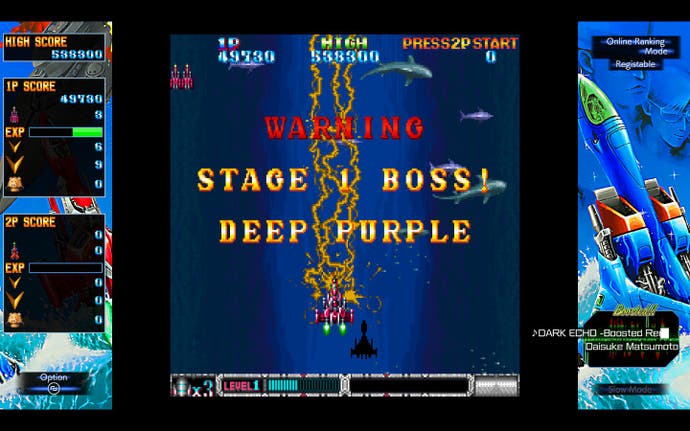
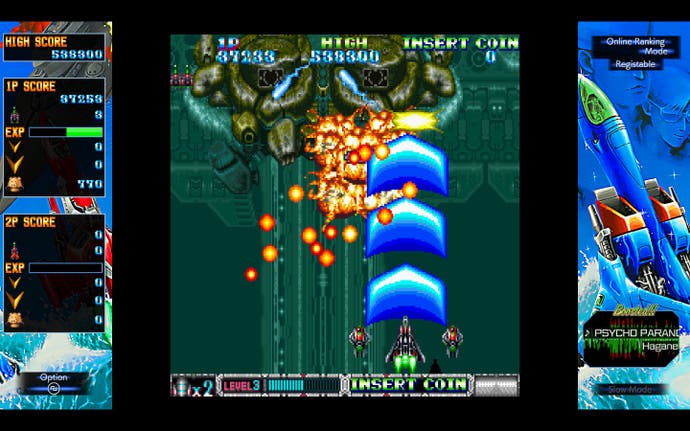
Toaplan shoot 'em ups such as Flying Shark, Truxton, Zero Wing, Grind Stormer and Twin Hawk each let the developer's staff explore how far the conventional shooter form could be pushed. The team's swansong, and final 2D shooter, was Batsugun. It served as a vessel for everything they had learned; a final statement of the Toaplan design philosophy, and an example of what the future of the genre could be.
The point is, Batsugun is important. It stands as one of the principal beats in the evolution of the genre. Some might say it lacks the scoring depth to be absolutely, undeniably a work of bullet hell, and they're likely right. Yet Batsugun certainly serves as a bridge between a past and a present. Before it there was no bullet hell. After its release, Cave and others eagerly iterated on its foundation, subsequently delivering some of the entire medium's most demanding, dazzling creations.
As such, Batsugun Saturn Tribute Boosted presents a chance to experience the emergence of bullet hell. It's also one of the more welcoming classic examples of the form - if you're yet to get a shooter 1CC (clearing the game in a single credit), this might be your chance.
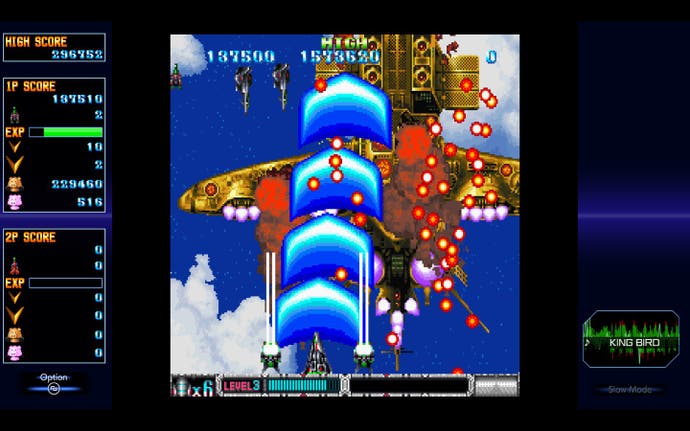
In establishing so much of the template of bullet hell, both included versions of Batsugun are highly conventional. Each contains five linear vertically scrolling stages. You get three lives at the outset of a run, with the option of popping in extra credits should you wish to continue.
The entire focus, of course, is on weaving through enemy bullet volleys while downing foes with your own firepower. This being a Toaplan game, along with the smaller 'popcorn' enemies, there's a higher than usual presence of more sizable enemies that demand a little more of a dance before they are downed. That lends Batsgun a brilliant physicality and sense of effort and destruction sometimes less present in more light-footed genre examples.
Very much in the military sci-fi category, Batsugun in its duo of guises bristles with gorgeously detailed and exquisitely animated pixel work, from the unfolding explosions and precise enemy sprites to the multiple-layered backdrops and derelict remains of those you down. The detail and craft on display goes beyond what you can appreciate while blasting, to the point you'll have to take a back seat while a friend plays through. It's worth noting here that Batsugun works better than many later shmups as a two-player game, bringing a knack for inspiring outbursts of excitement and joviality.
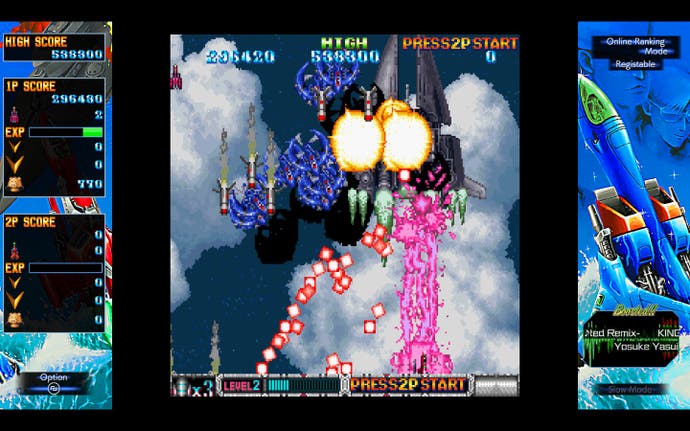
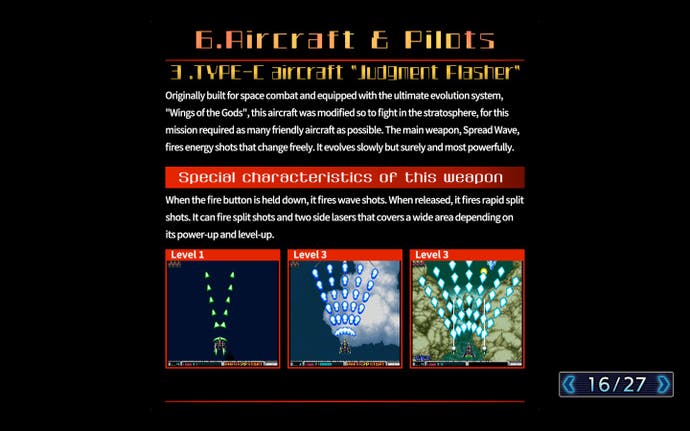
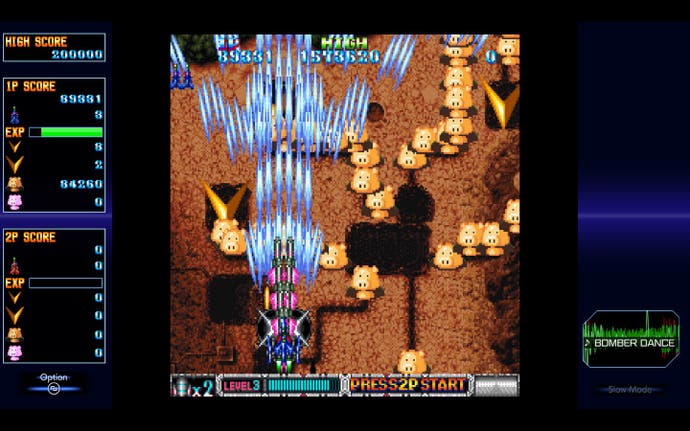
The soundtrack brings a spread of energising and upbeat chiptune tones that explore a suite of genres from pop to rock, emphasising a game that delivers a captivating sense of fun, drama and delight. And with Batsugun Saturn Tribute Boosted, you also get to switch out different versions of the games' sonic scores, from the PCB original to an entirely new remixed soundtrack from a spread of renowned game musicians such as Yosuke Yasui and the prolific WASi303.
Both versions of the game play snappily, with all kinds of room for drama. Few runs are the same, and unless you're a truly masterful player that has honed an ideal scoring run, you'll likely find yourself darting all over the place as all manner of close shaves keep you on your toes. There's a shade of depth to the scoring, involving the likes of picking up medals to cash in for more score at the end of a run, hovering over mysterious pig icons to hoover up points, bombing certain enemies, overusing weapon power-ups and more. There's also an XP-like weapon levelling system, but it's far from complex, and you can get plenty of fun from playing for score alone. But there's just enough there to dip a curious toe into Batsugun's prelude to hardcore shooting game scoring systems.
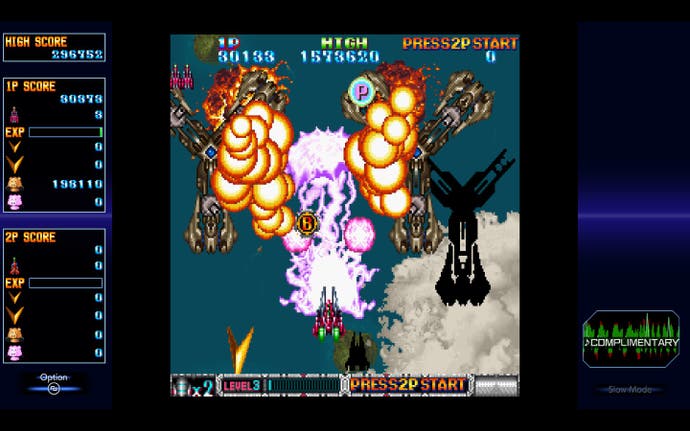
The rebalanced Special Version mode gives the visuals an overhaul, tweaks enemy behaviour, and reduces the hitbox size to make it slightly easier at the outset, while upping the sense of true bullet hell. Indeed, maybe Batsugun's Special Version should specifically carry the 'first bullet hell game' title, especially as it also adds 'loops'. That is to say, should you complete the game, it will start again on higher difficulty (foregoing some previous stages). Indeed, you can loop through Special Version several times, with enemies unleashing increasingly power waves of 'suicide bullets' on destruction, quickly overwhelming the screen to levels Cave would make a mainstay.
At this stage it's essential to delve into the port's performance and modernisation. Each mode is very much playable, and far from off. The thing is, what passed as a decent port when the Saturn version arrived in 1996 doesn't quite compare with the best arcade porting output seen today. The Saturn version pushed things around a little to better suit home screen dimensions, meaning a slightly squarer play area in contrast to the arcade original, that came at the expense of a little visibility. And it's that realisation of Batsugun that we get here. Of course, with Special Version never getting a final arcade release, this is how it looks; but a truly modernised update with arcade aspect ratio would have been an utter treat.
What's more, on day one the Steam version had all kinds of problems. The music stuttered and rasped, the game crashed repeatedly, and erratic slowdown of the bad kind pestered with the pace. A prompt patch fixed much of that, and the audio has since run fine, with no crashes. However, after some moments of pausing the game to adjust display settings, chronic slowdown set in, going beyond what is expected or even intended in the genre.
Sadly, there is also input latency present. That lag is neither tremendous nor game ruining. At times it seems imperceptible, and at other points it's tricky not to believe you can feel it. Regardless, across the shooter community tech sleuths have tested the game and confirmed lag's presence. If you're pursuing world record scores, that might be a problem. Otherwise, it's nothing close to profound, but an annoyance to know it's present when Batsugun deserves a devotedly thorough modernisation. Elsewhere there are some curious user experience shortcomings. Rotate the screen for true vertical play, for example, and the online leaderboard menus do not rotate with the rest of the game and UI elements.
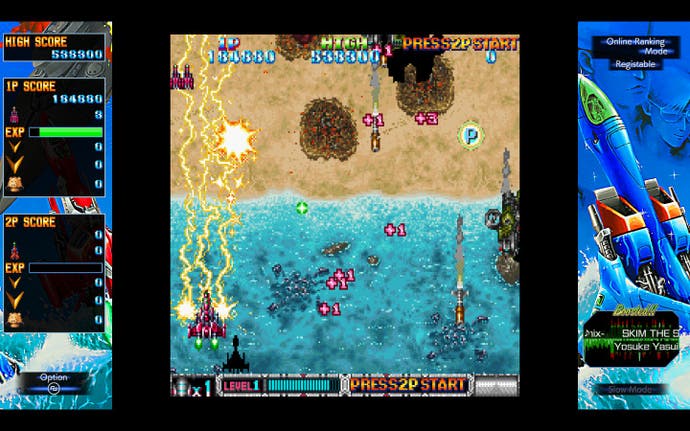
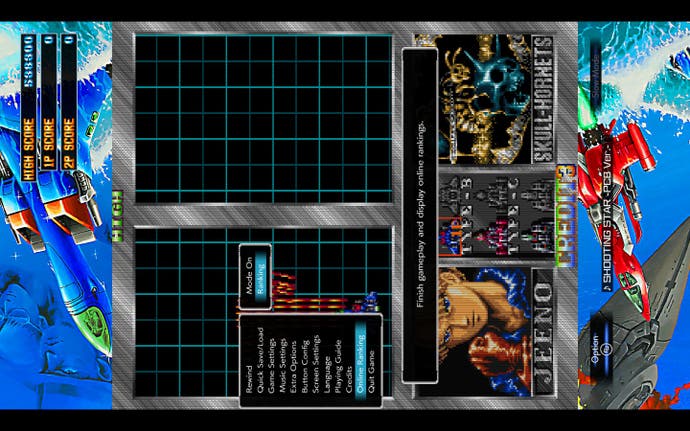
Curiously, while this review focuses on the Steam release, on playing the physical Japanese PS4 edition after importing it, while the lag was seemingly present, other imperfections and moments of lower performance seemed much, much less significant.
As for the modernisation features, there's the aforementioned online leaderboards, save functionality, a range of display options around the likes of rotation, anti-aliasing and scanlines. A 'slow' button has been added, allowing you to drop the pace if not playing for an online leaderboard position. Equally, there's limited scope to rewind progress after a mistake, and a scattering of new options that give you extra control over the game set-up. Finally, a new HUD provides the player with extra information around the gameplay area, although it's a rather meagre offer when compared to what porting house M2 has offered through its remarkable ShotTriggers series.
All of which leaves us with a slightly underwhelming modernisation of one of the shooting game genre's greatest stars. Batsgun was a very special moment, and remains an utter thrill to tuck into and explore all these years on. Does it deserve a more ambitious reworking? Absolutely. But there's a mountain of fun to be had here, and the Saturn Tribute Boosted version absolutely offers a gateway to all that followed in bullet hell.
